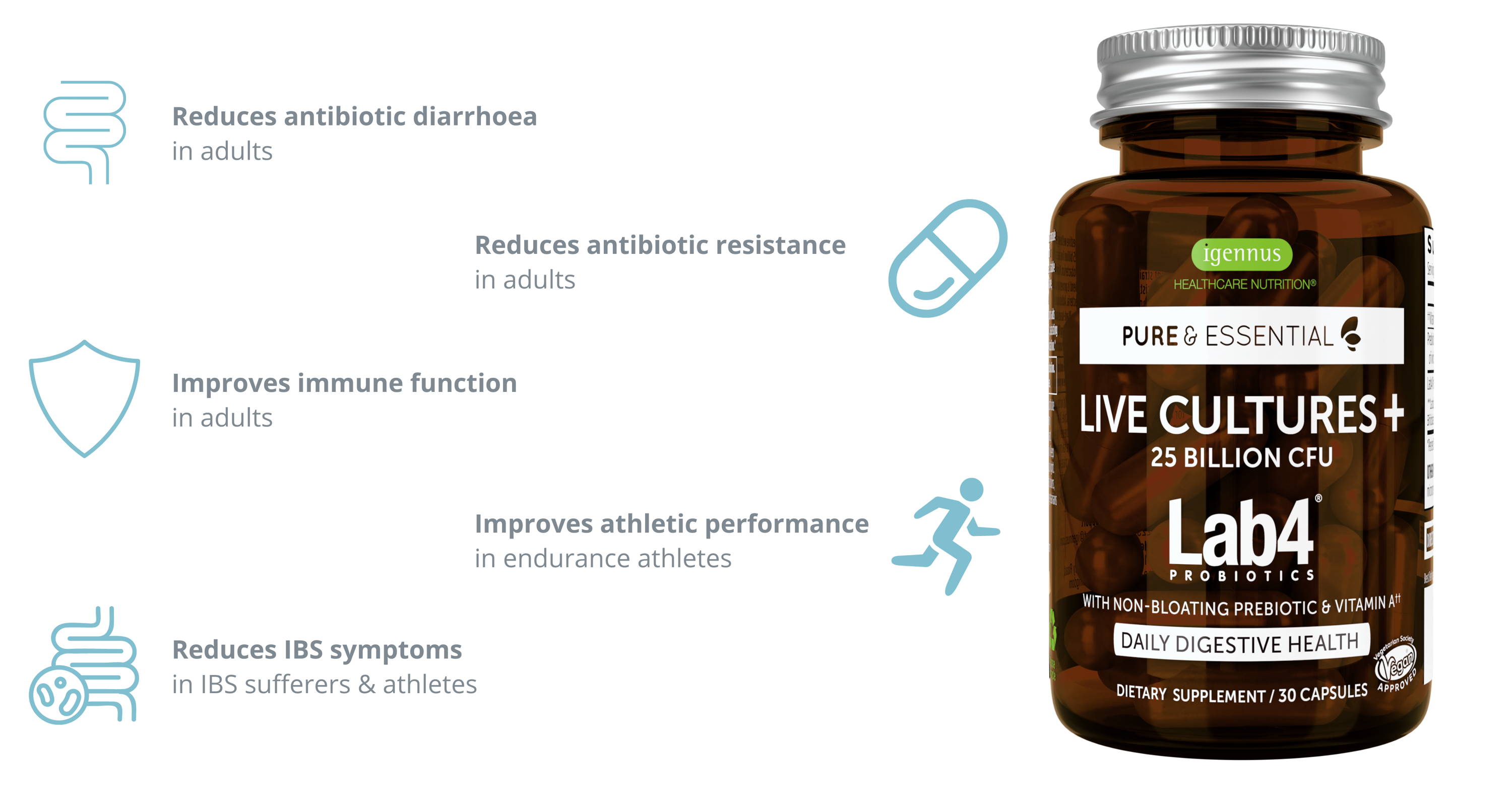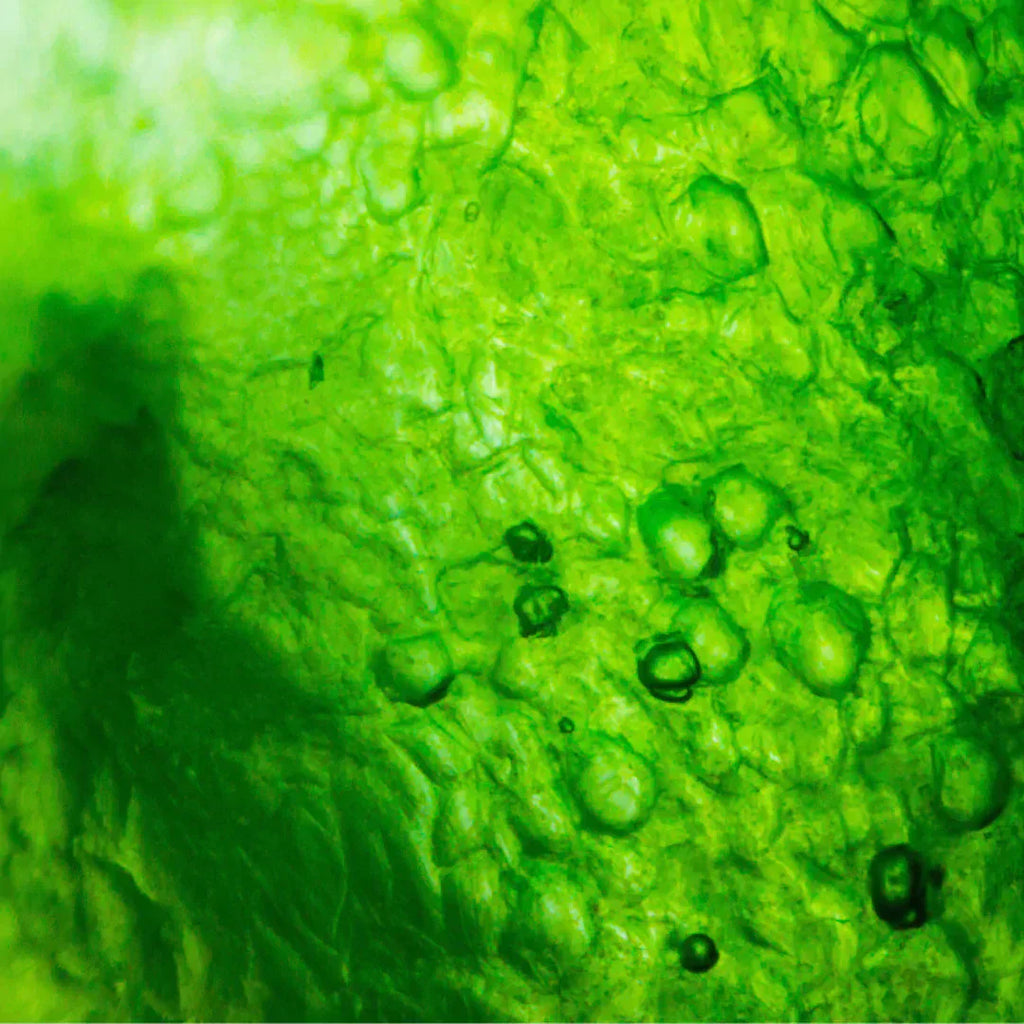Probiotics
Probiotics are live bacteria and yeasts added to yoghurts or taken as a food supplement to help support gut health. Probiotics work by improving or restoring the gut flora, the collection of microbes that inhabit our gastrointestinal tract (intestines). It is estimated that there are at least 10 times more microorganisms in the body than there are human cells and these microbes work synergistically with the human body, helping us to digest food and even produce essential nutrients like certain B-vitamins and vitamin K. Our gut flora also plays a vital role in maintaining immune health and supporting brain function, behaviour and mood. While the majority of the microbes found in our intestines are considered to be beneficial, some can be harmful, and a disturbance (known as dysbiosis) in the normal balance of microbes can have profound effects on both our physical and mental states. Stress, poor diet, and lifestyle choices and the use of drugs (e.g., antibiotics, proton pump inhibitors [PPIs] used to treat heartburn and even commonly used painkillers) are all key factors that can affect the delicate balance of microbes and lead to a dysbiotic gut. Topping up the ‘good guys’ with a probiotic supplement can therefore be extremely useful in helping to maintain the balanced gut flora, something that is vital for our overall health.
How to choose a good probiotic
The most commonly researched bacteria are those that belong to the groups' Lactobacillus and Bifidobacterium. Also known as 'genus', Lactobacillus and Bifidobacterium are then further defined by species such as Lactobacillus acidophilus or Bifidobacterium bifidum. The species can then be characterised further by its strain, such as Lactobacillus acidophilus CUL60 and Bifidobacterium bifidum CUL20. It is the strain that identifies the species as being clinically evaluated for its specific health effect[s]. Different strains of probiotics often have different effects, and while one strain of Lactobacillus may have a particular health benefit, it doesn't mean that all strains of Lactobacillus will offer the same (or any) benefit.
Essentially this means that not all probiotic products offer probiotic benefits. When choosing a probiotic, it is important that it be clearly labelled to include the genus (e.g. Lactobacillus), the species and strain (e.g. acidophilus CUL60), and amount (e.g. 25 billion CFU). The CFU (colony-forming units) refers to the number of microbes able to survive and reproduce in the intestines, and the probiotic manufacturer should be able to demonstrate that the CFU are stable throughout the product's shelf-life, not just at the input at the time of manufacturing. Many probiotic formulas may include several strains but favour large quantities of low-cost, poor quality strains while including insufficient amounts of the more vital strains that may die off over the product’s shelf-life. As such, to be considered beneficial, a probiotic must have been clinically evaluated to demonstrate the ability to survive the harsh journey through the intestines, to be able to colonise the gut effectively, and remain viable (alive) throughout the product's shelf-life.
Why choose LAB4®?
Pure & Essential Live Cultures+ Lab4 Probiotics® contains LAB4®, a patented blend of 4 probiotic bacteria strains comprising Lactobacillus acidophilus CUL60 and CUL21, Bifidobacterium bifidum CUL20, and B animalis (subsp. lactis) CUL34. The clinical benefits of LAB4® are supported by at least 13 published clinical trials (other trials are ongoing). In addition, all LAB4® products are produced using a novel ‘Tri-Phase’ three-stage micro-encapsulation and conditioning technology, to increase stability and protect the strains from degradation. The addition of ‘overage’ (extra) of bacteria further contributes to the stability and we manufacture at a dose of 50 billion CFU per capsule, and guarantee 25 billion CFU at expiry. The result is a high potency probiotic product, which is stable throughout the shelf-life at temperatures of up to 25°C, which means they do not require refrigeration.
Why add a prebiotic?
Prebiotic, a form of dietary fibre, is often included with probiotics to feed and to support the transit of friendly bacteria. Typical prebiotics include fructooligosaccharides (FOS) and galactooligosaccharides (GOS). However, because these types of prebiotic are forms of non-digestible fibre used to feed and fuel the probiotic, consuming them can often cause unpleasant side effects associated with gas production, such as bloating and discomfort.
In Pure & Essential Live Cultures+ Lab4 Probiotics, we use Aquamin®, a novel plant-sourced calcium with prebiotic properties. Its unique honeycomb-like structure transports probiotic bacterium through the harsh environment of the gut and delivers them safely to the intestines without unwanted side-effects.
Added benefits of Aquamin® calcium
The absorptive and protective functions performed by the cells lining the gut are highly dependent on their ability to self-renew. These cells must be replaced to keep up with the rapid rate at which they are naturally shed. Calcium plays a role in this process of cell division and specialisation, thereby directly helping to ensure the healthy renewal of both absorptive and immune-supporting cells. Calcium is also required for the production of digestive enzymes that are vital to the breakdown and successful absorption of our food. Calcium also has a beneficial role by directly influencing the health of the gut and the gut microbiota. Calcium draws out and binds with toxic substances naturally found within in the intestines creating a less aggressive, less hostile environment in the gut, thereby favouring the growth of beneficial microbes.
Vitamin A and gut health
We have added vitamin A to Live Cultures+ Lab4 Probiotics. Like calcium, vitamin A plays a role in the process of cell specialisation. Vitamin A also contributes to the normal function of the immune system and is especially important because it contributes to the health of the mucous membranes that line and protect the gut. We use beta-carotene, a safe alternative to vitamin A as retinol.
What are the benefits derived from regular use of Live Cultures+ LAB4 probiotics?
- Balance friendly gut bacteria
- Improve digestive health
- Maintain a healthy ‘gut barrier’
- Support antibiotic use
- Reduce gastrointestinal inflammation & boost immune function
- Reduce symptoms associated with digestive disorders
- Improve cognitive function








